In "De Rerum Natura", written during the republican era and rediscovered only in the fifteenth century, Lucretius stages the description of the Athens plague of 430 BC: the picture is deliberately bleak and bears the mythical features of the space-time indefiniteness that characterizes the crepuscular epochs. Once the subjects and the space-time horizons have definitively fallen, what remains is a gloomy picture of death with spectacular and macabre shapes, which the author nevertheless uses to convey an ethical criticism, making use of a solemnly rich lexicon of archaisms, capable of to probe unexplored places of the human soul and of the word itself.
di Salvatore Di Domenico
(review: Marco Maculotti)
cover: John Martin, “The destruction of Pompeii and Herculaneum”, 1821
Il Rerum Natura is a vast didactic compendium in verse on the functioning of natural phenomena, from magnetism to simulacre love, from the turning of the heavens in atmospheric events to the changing condition of the human soul. The work is composed of you are books whose content was disliked by Christian doctrine, to the point that in the Middle Ages the Lucretian work was not transcribed and therefore risked being irreparably lost. Why the Rerum Natura did it arouse the fear of the defenders of Christianity? It is easy to say: Lucretius proposed, among other things, to unveiling the deceptive aspects of existence and to warn men about vanity of time, anxieties as well as hopes, from an openly epicurean point of view and incompatible with the eschatological vision that characterized medieval Christianity. Furthermore, Lucretius came to attribute to Epicurus, not too covertly, even a role messianic, which could have been read, in retrospect, as dichotomous with respect to that of Christ.
The text came rediscovered only in 1417, thus remaining in the oblivion of history for over a millennium, having been composed at the height of the republican age, in the first century. B.C This is one of the reasons why the work carries with it an aura of mystery, further accentuated by the almost total lack of biographical evidence on the author. To curate the edition of Rerum Natura fu Cicerone who, while distrusting his author in public, praised him in a private letter that has reached us. Other among the greatest Latin writers (Stazio, Quintilian, Ovid) praise its style, but no one adequately commented on its content. This suggests that Lucretius was actually already disliked and "dangerous" for the contents of his book already in his time, therefore before the advent of Christianity, so much so that Ivano Dionigi spoke of him as a "Unprotected poet like Dante was" (who for historical reasons never read Lucretius), identifying some similarities and differences between the two, both defined "Cosmic poets, poets of salvation and of knowledge", although positioned on "opposite theological poles".
Lucretius, as mentioned, disappears in theocratic age. Among the merits that must be recognized is that of having tried - in a flourishing era but close to the decline of civil wars and already devoid of its gods, where the strong impositions of religious power are loosened - to to disenchant the images used by politics to control the masses. The Lucretian one can then be considered as a revolution that has its primary objective the demolition of that harmful union between religion and politics and the deconstruction of the theocratic control system by means of scientific knowledge (to the point that, perhaps too imaginatively, some modern critics even wanted to recognize a Marxism ahead of time, with regard to the longing for the liberation of the proletariat from the yoke of religious power, "false and wicked in the demand for sacrifices").
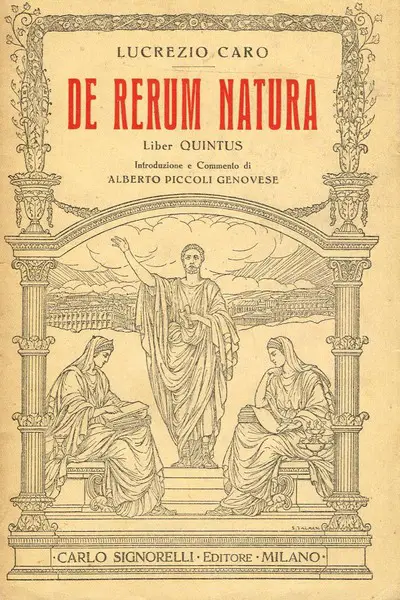
⁂ ⁂ ⁂
One of the reasons why there is almost no news on the author's life can be seen in his almost total lack of interest in the worldly and political life of the city, in this perfectly faithful to the Epicurean maxim of "live hidden». Some news, however, is reported to us almost five centuries after his death from San Girolamo in chronicon from the XNUMXth century AD The saint, pointing to Lucretius of an iconoclastic materialism, mentions that the poet suffered from a particular madness, described as something we would call today bipolar disorder:
"[...] the poet Titus Lucretius was born, who later went mad as a result of a love potion, after having written some books in the intervals of lucidity of madness, which Cicero then revised for publication, killed himself by his own hand. age of 44 years. "
But this last information is unlikely to be true, as San Girolamo is the only one to report it. It can also give rise to certain theories for which, losing the protection of the patron Memmio (to whom the work is dedicated), Lucretius would have fallen from grace and would have chosen suicide for political reasons - an event, moreover, not rare in Roman history.
Beyond these hypothetical and arduous conjectures, however, it should be noted how often attempts have been made to justify the enigmatic and complex ending of the Rerum Natura with the author's theory of madness and the scarce ancient knowledge of the causes of psychic disorders. Apparently, however, Lucretius treated his supposed ailments with philosophy and writing, thus maintaining a high state of lucidity, so much so that some like to compare his "lucid" madness with that which distinguished badger many centuries later.

⁂ ⁂ ⁂
Nonetheless, if some believe the Rerum Natura an unfinished work, others see in the finale a message of profound hermetic power: the work ends with about two hundred verses describing the filthy and obscene events of the plague of Athens of 430 BC To this end, Lucretius is inspired by the model of Thucydides, however, denoting a greater psychological refinement, with which he manages to highlight the consequences of the disease on the unbalanced behavior of "mortals" already sick in the soul, thus compromising the slightest glimmer of healing, which instead exists in Thucydides until at the last.
At the beginning of the last book, the VI, inpraise of Epicurus the author tells of how men now led lives free from any concern, with "the table prepared" and the stomach always full, basking in the sinister pride of seeing their descendants affirm themselves socially and softly enjoying the accumulated goods; to then conclude comparing the human soul to a corrupt vessel (i.e. punctured and unable to fulfill its function) and dirty, capable of turning good things into bad things. Thus the verses 9-23, here in the translation (albeit dated) by Pietro Parrella:
“He [Epicurus] saw that, all being already given to mortals
for their needs, being able to secure enough
they lead their lives, of fame, of honor, of riches
to be proud and powerful, to enjoy the praise of children,
even in their intimate breasts they all bore fetters
thorns of trouble, and in vain of assiduous anxious care
they tormented the spiritforced into cruel laments.
The man himself, he said, is to blame for it, for he is corrupted in it
as in a corrupt vase, what I enter penetrates and descends,
even if it is good: partly because it is badly connected and perforated
it never allows itself to be filled, partly because of its own dirt
fetid stench all contaminates what is closed there. "
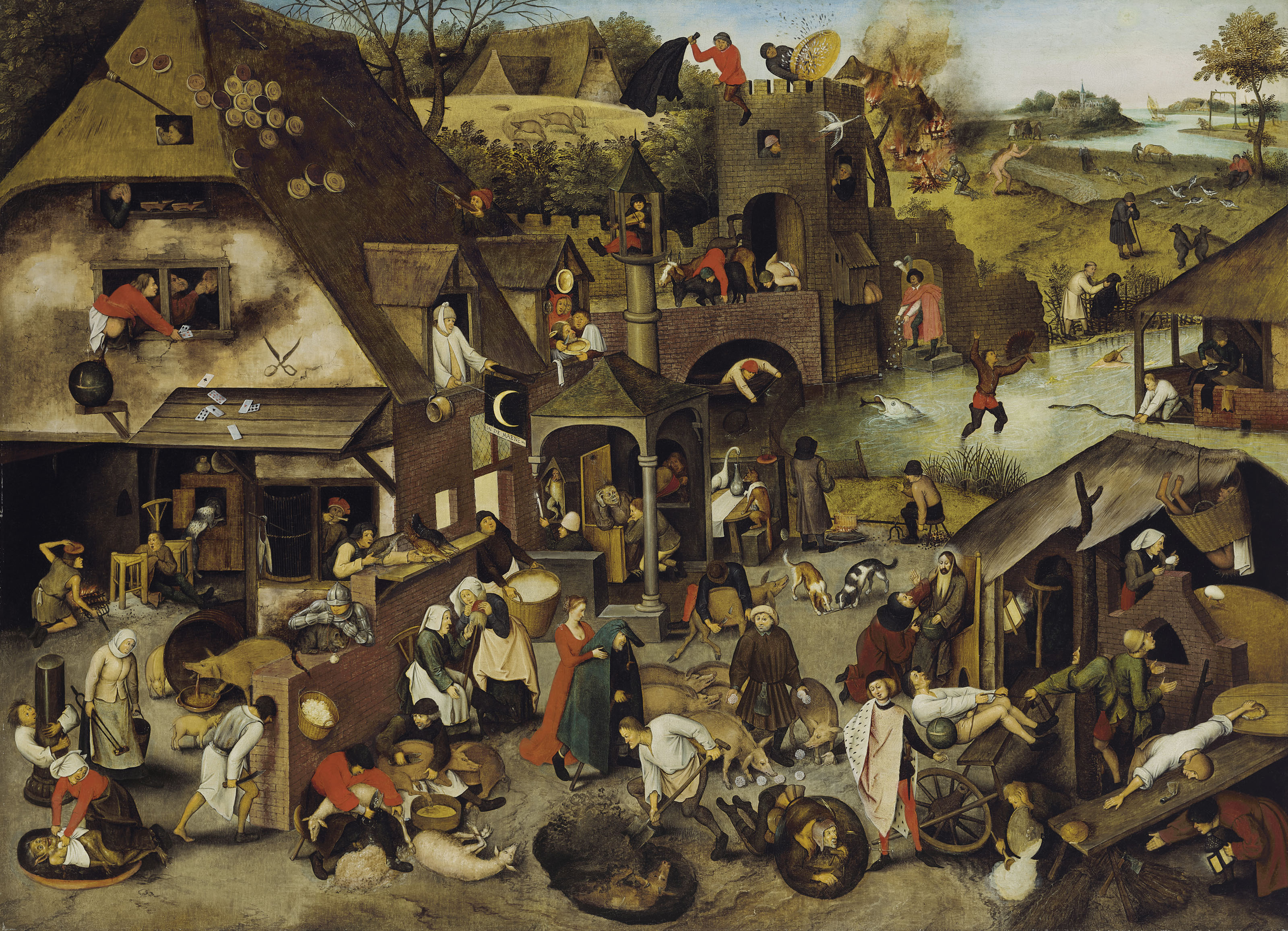
As can be seen from the passage, the men equally suffered one anxiety chords ("Anxiety of the heart, of the spirit") which, hidden behind the social conventions and masks that alternate on the stage of external existence, would actually be destined to hatch in a more or less latent way, to then explode in the great collective drama that causes, so to speak, the "breaking of psychic banks" (in the Lucretian work, the plague of Athens). In doing so, the author identifies the theme existential of his work: paying attention not so much to the high abstract ideals of virtus as for the earthly ones of the precariousness, implying on several occasions how the human soul is, de facto, perpetually undermined by undefined or unrealizable desires (explained in book III).
Because of such an obscure philosophical orientation, some modern criticisms have spoken of Lucretius as a "Poet of anguish" or of an "Cursed poet", however, it is also necessary to underline an interpretation of the opposite sign that relies on the Lucretian image of "Luminous writer" (di glossy carmina), rational and materialistic, who took advantage of the adherence to the doctrine of Epicurus to denounce the fact, for him incontrovertible, that all human anxieties would come solely from fear: fear of death, of the gods, of the otherworldly place; fear which is lack of rationality, or of light, in our attitude to life.
We then find it very difficult not to connect such anxiety chords with simulacre religious with whom man deceives man: in this sense the Lucretian one is a poetry of liberation of the mass from the subjugating power of religion or - therefore - of fear. Regarding this, it can be cited as Cicero wrote that the haruspicina, that is, those who made predictions by interpreting the flight of birds in the sky, after reading the movements and cries of a vulture or a crow or other birds, and after having dictated to the people the prescriptions to which he would have had to adapt, sometimes, after withdrawing away from prying eyes, they laughed, pleased with the gullibility of the demos.
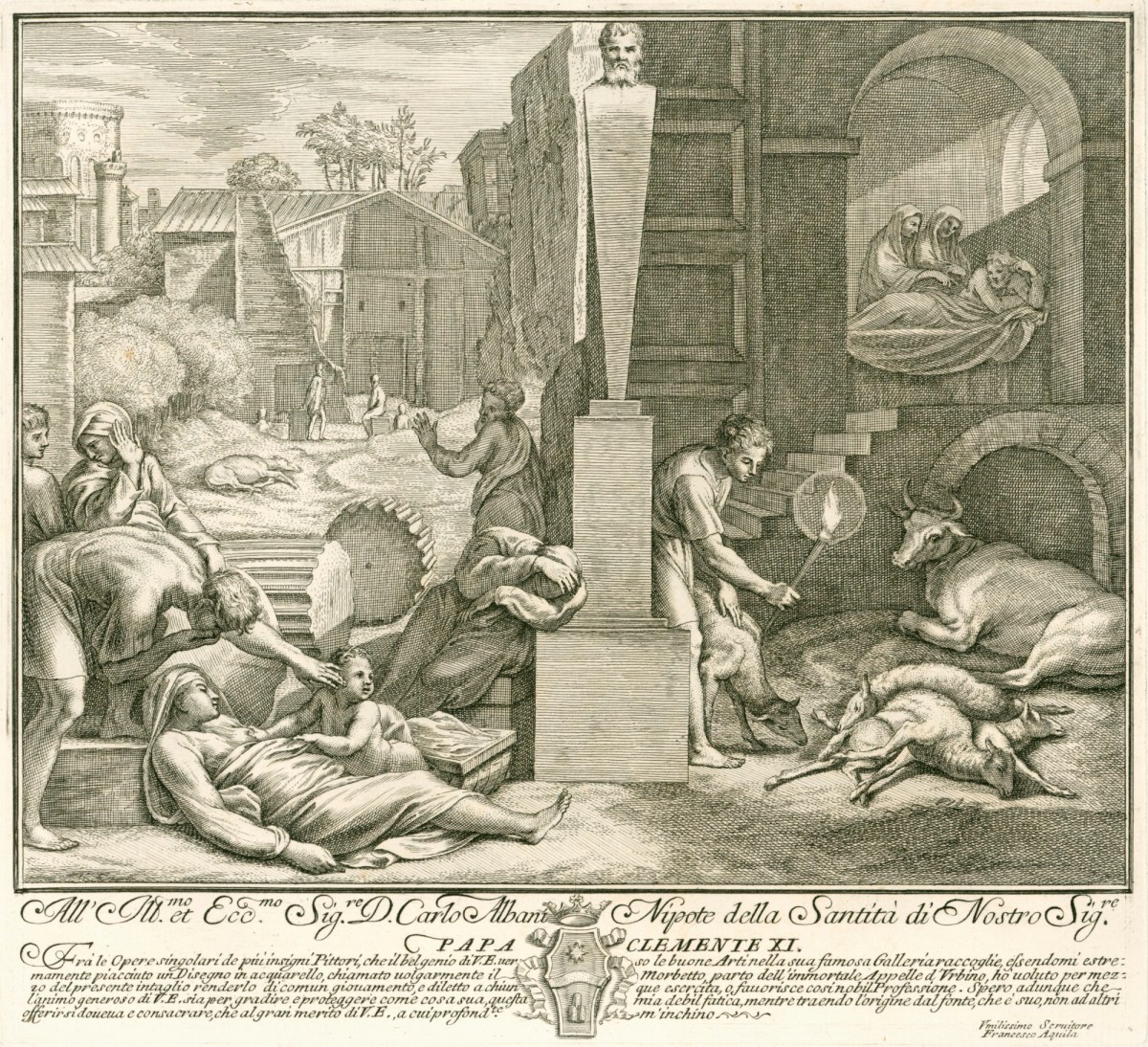
⁂ ⁂ ⁂
Perhaps for this reason too book VI (called the "meteorological book" by some scholars) continues with the explanation of atmospheric and geophysical phenomena - such as storms and rainbows, tides and earthquakes, volcanic eruptions and river floods - aimed at misleading, with the discursive means proper to Epicureanism, the beliefs centered on superstition, mocking those who believe in the anthropomorphic image of Jupiter who, from his Olympic venue, hurls lightning and thunder and lightning on the earth's surface, phenomena for which a detailed physical explanation already existed at the time.
During the apical era of the Republic, years in which Lucretius wrote, on the historical threshold of the empire, these superstitious practices were configured perhaps as never before as mere tool of power. In ancient times, it should be remembered, technical and scientific knowledge was disseminated within secret environments with an initiatory scent (as it originally happened with the same writing), so that those who possessed such knowledge, sometimes indispensable for survival itself (think of how useful it could be to be able to distinguish a poisonous plant from an edible one, or simply knowing how to recognize the tools for ignite a fire), could exploit such information and techniques to obtain and consolidate certain forms of power with respect to those who, on the contrary, ignored them. (It is, on the other hand, what is found today in the economic sphere under the name of «information asymmetry ", a condition in which information is not fully shared between individuals who are part of the economic process; consequently, some of the agents involved have more information than the rest of the participants and can take advantage of this configuration).
Furthermore, Lucretius notes, with the continuous changes that occur in the world of Becoming, the terms of theanxiety ropes of which we have said (at least in its real form, if - rightly - we want to consider theanxiety chords human being the same in all epochs): this arises in the first place from the satisfaction of natural and primitive needs and from the automatic compliance with instinctual tendencies (such as procuring or producing food or clothing or, again, procreating). We then come to no longer recognize real and primary needs as fundamental, but as due or already given; and, therefore, the secondary ones as necessary. Among the merits that must be recognized to Lucretius there is also this: having been able to unmask this deception, realizing that the needs that man deems necessary in reality are not, on the contrary, if fully satisfied, they would irremediably distance him from the immanence of life, or from what alone has the power to make it into an existence authentic.
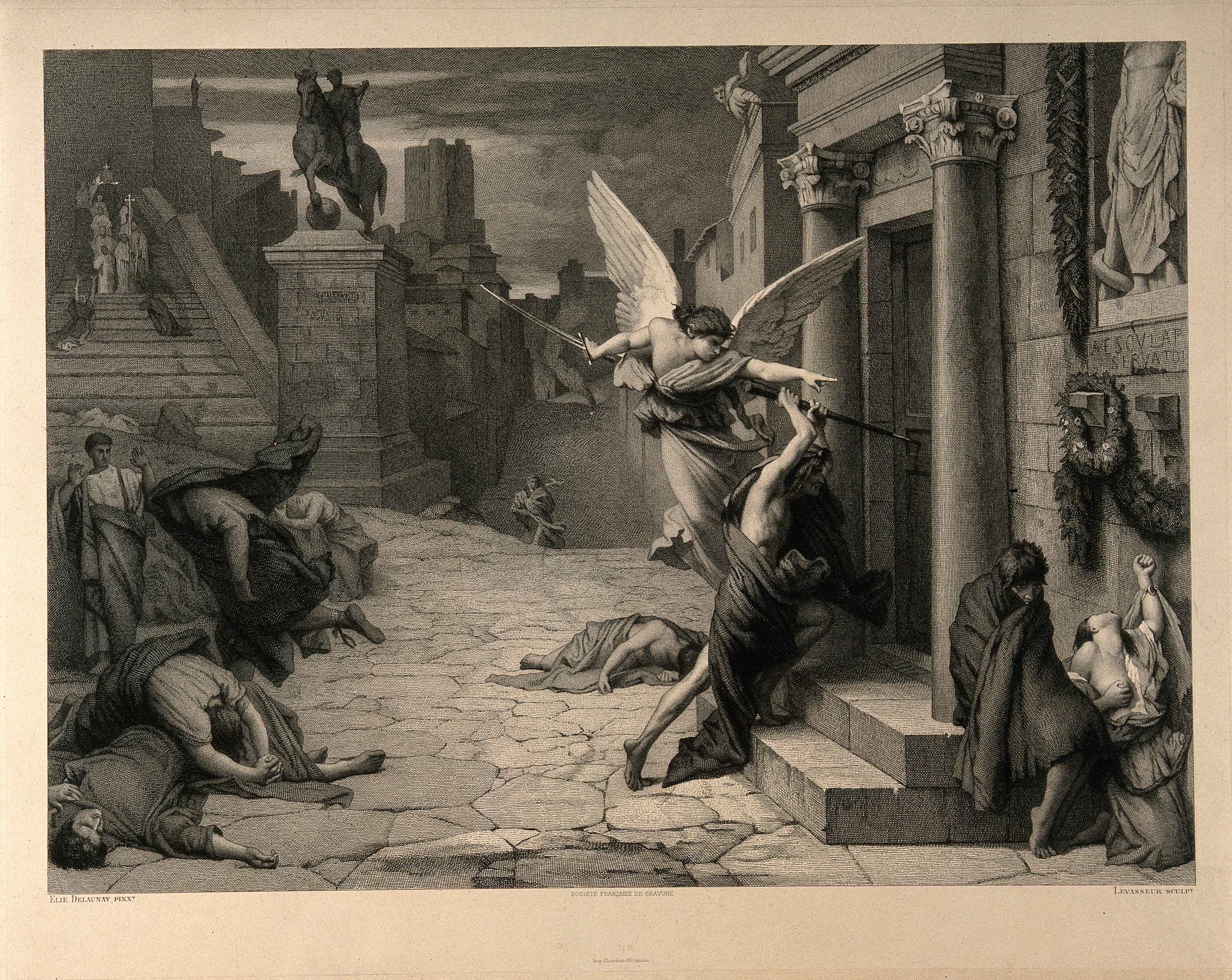
⁂ ⁂ ⁂
With these premises, Lucretius stages the description of the plague of Athens. The picture is deliberately bleak and door the mythical traits of the space-time indefiniteness that characterizes the crepuscular eras. Once the subjects and the space-time horizons have definitively fallen, what remains is a gloomy picture of death with spectacular and macabre shapes, which the author nevertheless uses to convey an ethical criticism, making use of a solemnly rich lexicon of archaisms, capable of from probing unexplored places of the human soul and of the word itself.
First of all he generally mentions the diseases that affect the whole world, according to the different climates of the various parts of the globe; then move on to mention the specific ones that strike generatim, that is "according to the species": thus, the Egyptians suffered from elephantiasis (skin thickening), the Attics often got sick in the feet and the Greeks in the eyes. Then he describes how, even without physical contact with the carrier of the disease, clouds of infected air can extend its spread indiscriminately:
“Such a wave of pestiferous germs, such a lethal flow
In Cecropia land one day surrounded the countryside,
it made the streets silent and the houses empty.
It drew the contagion its first origin in the depths of Egypt;
then, a great stretch of air traveled, on the sea levels
flying over, he finally rested on the whole people
of Pandione: infected men perished in throngs »
He then dwells on the symptoms and lists them, partly following Thucydides' model: first the disease takes to the head, which heats up; then her eyes flush and her throat sweats blood. The voice then slowly dies out and the tongue dripped with blood, interpreter of the soul ("messenger of the soul"), becomes lazy and rough. The mind lost all reasoning and the sick groaned on the ground, devastated by a continuous sobbing. Although only a slight warmth was felt to touch them, the infected felt the skin strewn with wounds burning to such an extent that they could not bear even a thin veil; and the internal organs burned with the same intensity. The infected mechanically made spasmodic movements that frayed their nerves to the point of definitive collapse, a telltale sign of a "suffocating anguish" (anxius angor) which led them relentlessly to death.

⁂ ⁂ ⁂
The Lucretian passage does not abstain frominvestigate the psychological dimension, madly expanded by the atmosphere of collective despair that accompanied the unfolding of events, proceeding to a list of the acts of madness that followed the physical contagion: craving for cold and wind, the sick ran to throw themselves into wells or rivers, even without finding relief, sometimes dying, and with inflamed and tired eyes they asked for help, but there was no drug that worked; To make matters worse, the drug that saved someone else killed and there was no one remedy that worked for everyone. The visions of death then took over:
« Truce the pain did not have: they lay, exhausted of strength,
without motion, the sick. They wanted them, anxious,
eyes wide open, lit by disease, but closed for sleep,
to ask for help; but, anxious and unaware, she was silent
the art of pharmaceuticals. And other clues appeared then
of imminent death: mind upset, burdened
of nightmares and sadness [...] "
The limbs trembled and the cold spread throughout the limbs, a general deterioration caused the temples to sink and the eyes to sink; within eight or nine days the disease led the unfortunate to death. If someone's physique resisted the virulence of the disease, it automatically worsened and streams of blood began to come out of the nose as well; the disease reached every part of the body and, with the chimera of avoiding death, the infected by now mad amputated their hands or feet, or even their genitals. Some forgot everything and completely lost their lucidity, regressing to a state of total unconsciousness.
More: Lucretius's description is not limited to infected men, mentioning as well animals also weakened by evil, which drag themselves dying half hidden in the forests. But above all, the effects of the disease among those who were not infected with it. In the collective psychosis created by a permanent state of terror and danger, people no longer knew how to react: those who, too eager for life, shunned all their loved ones for fear of getting sick, in the end died themselves strangers to any help; the virtuoso who, in order to assist loved ones in the last moments, became infected, driven by a sense of honor and the pleading voice of the dying, was destined to follow them immediately into the Underworld.
Numerous children also died, on which little bodies tormented by the disease their parents piled up; elsewhere, young children buried their fathers. Much of the contagion flowed from the fields, which then spilled over into the cities for "the dense rush of sick colonists from every already infected area". Those who did not die from the effects of the disease were weakened by poverty, which spread everywhere more and more, parallel to the plague.
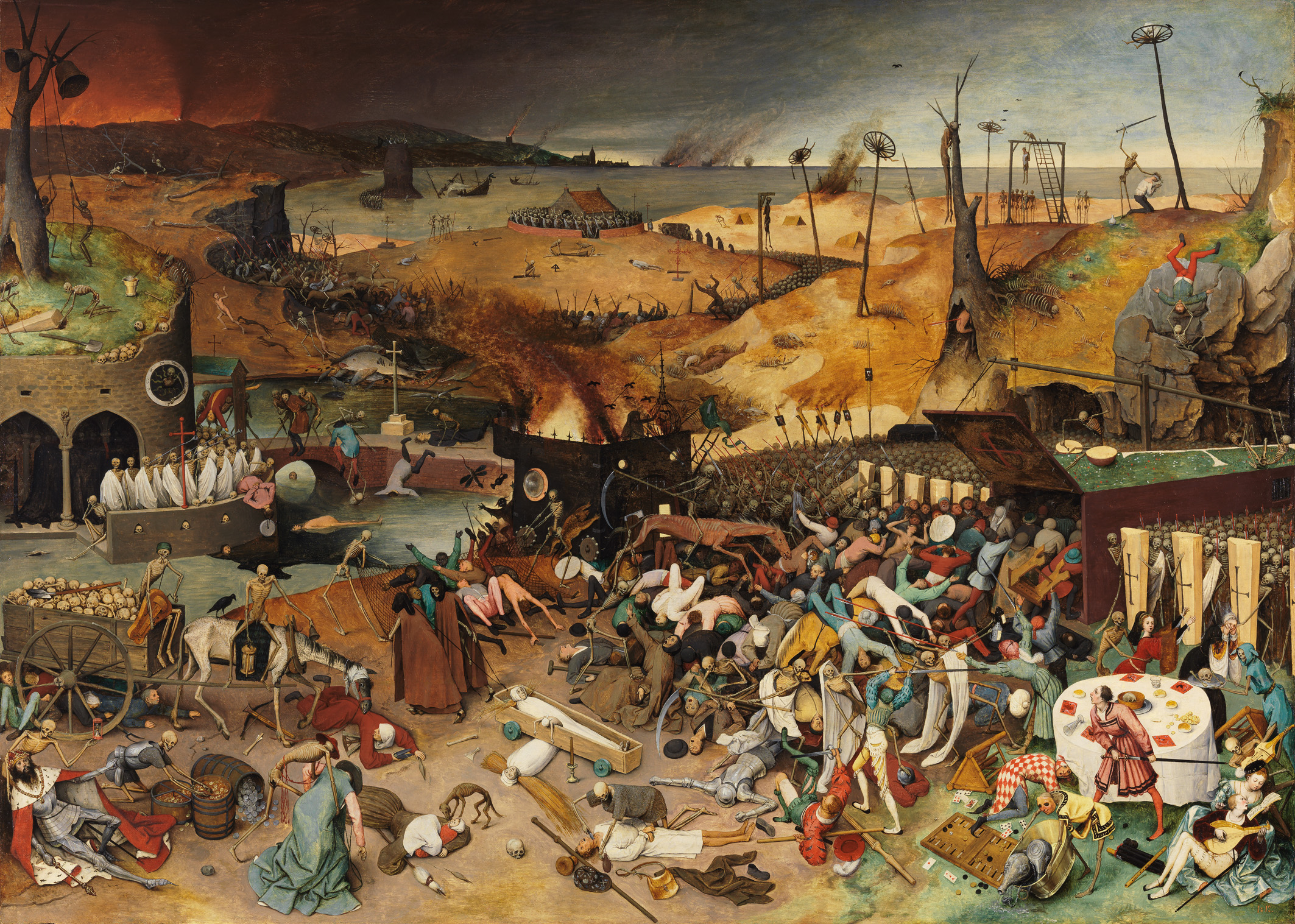
Even the gods, definitively deprived of worship, died and the practices were abandoned, since even the sacred places were contaminated by disease and death. Divine worship was no longer held in honor, nor was there fear of the gods; burial rites were no longer respected and on the piles erected for the fires of others people put their dead, thus giving rise to senseless fights.
Then, the sudden silence: thus ends the Rerum Natura. wanting to retain the genuine ending - that is, wanted by the author, and not "incomplete" -, one can perhaps identify a point of contact with the Homeric model ofIliad, which also ends with a burial rite. But it can also be seen there the hysteron proteron (chronological inversion of events, beginning and end) with which Lucretius perfectly closes the thematic circle by reconnecting at the beginning of the work, thus suggesting one reading circular, consistent with the doctrine of the cyclicality of universes which went hand in hand with the Epicurean atomic doctrine. But, on the other hand, it seems to us that this ending also draws a world that is deaf and devoid of the teachings of Epicurus, leaving open the looming need to find them, as well as demonstrating the vanity of those "gods" so easy to fall.
⁂ ⁂ ⁂
At this point we ask ourselves what is the profound meaning of such a fulminating ending, which has so complicated, in the overall view, the articulation of the aforementioned critical positions. To us it seems that Lucretius by means of such a "vivid" description of the effects of the plague, he wants to somehow "normalize" or "humanize" death in order to defeat its timor indelibly connected to his innate impersonality (that is to say to his action that he carries out in an indiscriminate and unpredictable way), distinguishing himself in this from the text of Thucydides which, in his chronicle realism, paradoxically appears more anxious from this point of view.
It also seems to us that, by doing so, Lucretius in a certain way wants to suddenly distance himself from himself and from his teaching (here is where some critics see the madness or bipolar disorder of the author), yielding, as an appendix to the philosophical and scientific exposition inspired by the principles of Epicurus, to a suggestively pathetic emotion (in the sense of "rich in phatos") and melancholy, as if to remember with sudden lucidity the ephemeral vanity of the universe, which in no other way can end except in death, which leads all manifested things back in the unmanifest.
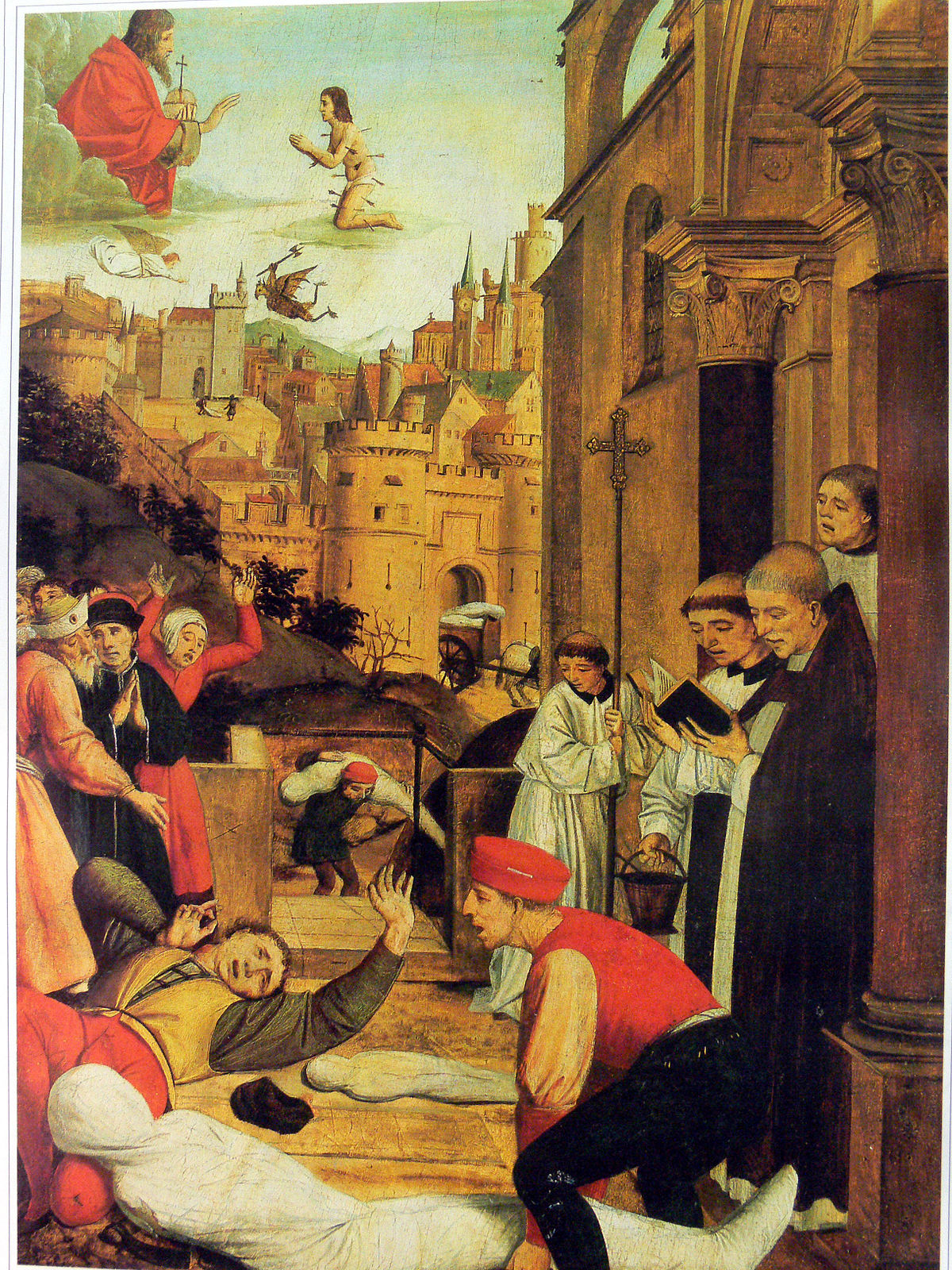
The call of the "unquenchable thirst"With which both Love is defined in Book IV and the continuous search for wind and freshness by the infected in VI makes the theme of the plague and that of mirror-like love, and therefore inseparable from the point of view ofanxius angor, the "breathless anguish", a real psychic disease inherent in the human race, which proteically takes various forms within the heterogeneity of human experience. Love and death are thus placed on the same level: in love and plague are similar in their respective "unquenchable thirst" which distinguishes them as a brand in focus.
As a last note of disenchantment, we would like to finally underline how Epicurus claims to be his teaching of the few and not of the many, just as Lucretius probably considered his own work for a few "brave": most prefer to be lulled by tales well thought out by those in charge to keep the masses in a quiet life and fill their existential anxieties with the help of false dogmas and superstitious beliefs. In this regard, we want to conclude our analysis with some quotes reported by Seneca in Letters to Lucilius:
"Democritus writes:" In my opinion, a single person is as good as all the people and the people as much as a single person. " He also says that the other one well, whoever it was (it is uncertain, in fact, who it is); they asked him why he applied himself so hard to a subject that very few would have understood, [and he] replied: "I only need a few people, even one or even none." Excellent also this third affirmation, of Epicurus; in one of his letters to a fellow student: "I speak not for many, but for you;" writes, "We are a sufficiently large theater for each other." [...] why [Lucilius] should you rejoice if there are so many who understand you? " "
Thus, we like to think that in the finale of the Rerum Natura we can also read between the lines this approach with which Seneca posed himself towards his correspondent interlocutor, and which Lucretius would seem to address directly to the reader:
"I don't write for the many, but for you, who, come to the end, now you observe the folly of men. "
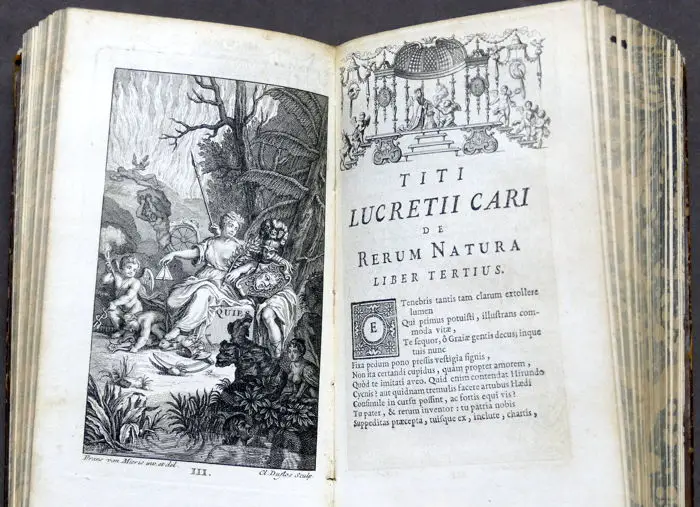

3 comments on “The plague and the simulacra of social control in Lucretius's "De Rerum Natura""